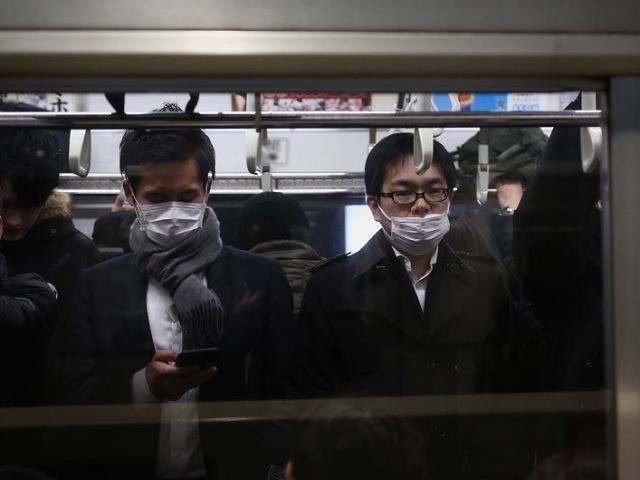Japanese Health Ministry found a 20-percent decrease in the number of suicides between April 2020 and April 2019, it revealed this week – a notable decline, particularly given that suicide hotlines report struggles to cope with demand.
Japanese officials announced on Thursday that it would begin easing mobility restrictions set in place to contain the Chinese coronavirus, currently threatening the populations of nearly every nation on earth. Prime Minister Shinzo Abe declared a state of emergency on April 7, set to expire on May 31, but announced this week that the rate of transmission was not as severe as expected, allowing the resumption of some business activity.
At press time, Japan has documented 16,049 cases of coronavirus and 678 deaths.
Unlike many other nations, including the United States, Japan did not institute a total ban on business and other activity, but did shut down its schools and give local governments discretion to shut down high-risk activity in densely populated areas.
Tokyo’s TBS broadcaster reported that the Japanese government logged 1,455 suicides during April 2020, as opposed to 1,814 suicides during the same month of 2019, or about a 20-percent drop – the largest drop in five years. TBS posited that the stay-at-home recommendations and closed schools eliminated stressors on those struggling with mental health that would have otherwise triggered self-destructive activity, among them workplace pressures, bullying, and commutes.
The Guardian, reporting on the numbers, noted that young adults not having to go to school may have prevented them from being exposed to bullying that may have inspired suicide.
“The start of the academic year, in April in Japan, is a particularly stressful time for some, but its postponement due to the pandemic may have saved lives, at least temporarily,” the U.K. newspaper reported, citing a former official at the Japanese Federation of Inochi no Denwa, a coalition of suicide prevention organizations with a nationwide presence.
“School is a pressure for some young people, but this April there is no such pressure,” Yukio Saito, the Federation of Inochi-no-Denwa former official, told the newspaper. “At home with their families, they feel safe.”
The decline came as something of a surprise given the volume that suicide prevention agencies reported of demand from the general public. Japan’s Kyodo News reported on Thursday that the nation’s Inochi no Denwa, the suicide hotlines, are “struggling to manage the flood of calls they are receiving from people with coronavirus-linked health or financial concerns while also trying to ensure their all-important counselors remain virus-free.”
“Many callers divulged fears about their job security due to business closures or a sharp fall in customer numbers, while others said they had suicidal thoughts after family members became infected with the virus,” Kyodo noted. One of the busiest Inochi no Denwa told Kyodo that as many as 80 percent of the calls they are currently receiving are related to Chinese coronavirus stress.
As part of a larger trend, the decline in the national suicide rate in April reflects decreasing numbers documented in the past several years. Japan has one of the highest suicide rates in the world. In 2017, the Japanese Health Ministry published a survey finding that as many as one in four Japanese citizens had contemplated suicide. Women were likelier to admit contemplating suicide, but men were more likely to attempt it. This year, however, the Japanese government revealed that 2019 was the tenth straight in year in which it documented a decline in total suicides nationwide. In January, the government reported a 0.7-percent drop in the number of suicides per 100,000 people between 2018 and 2019.
While the progress was encouraging to the government, those who operate suicide prevention groups noted that much work remained to be done.
“The fact that 20,000 people still die by suicide a year is a very unusual situation and is nothing to be optimistic about,” Yasuyuki Shimizu of the Tokyo suicide-prevention nonprofit Lifelink told UPI. “Municipalities should do more to help their residents live their lives, and the government should support such policies more robustly.”

COMMENTS
Please let us know if you're having issues with commenting.